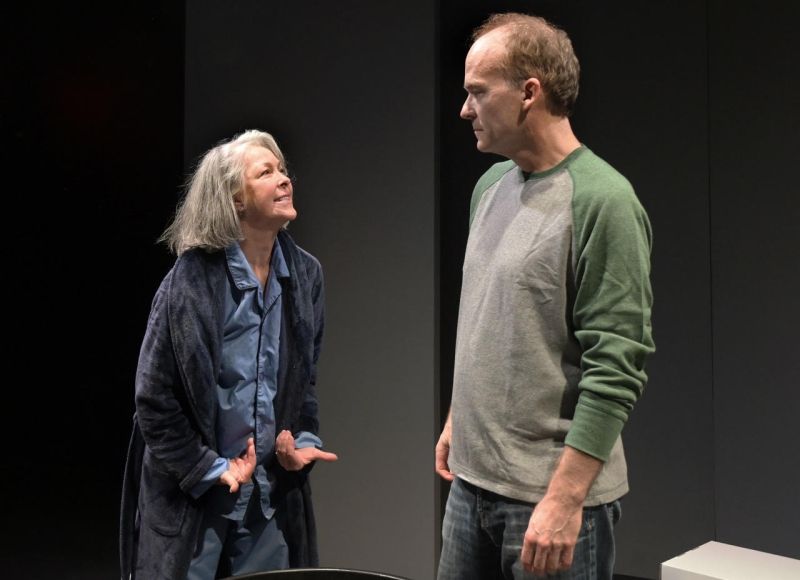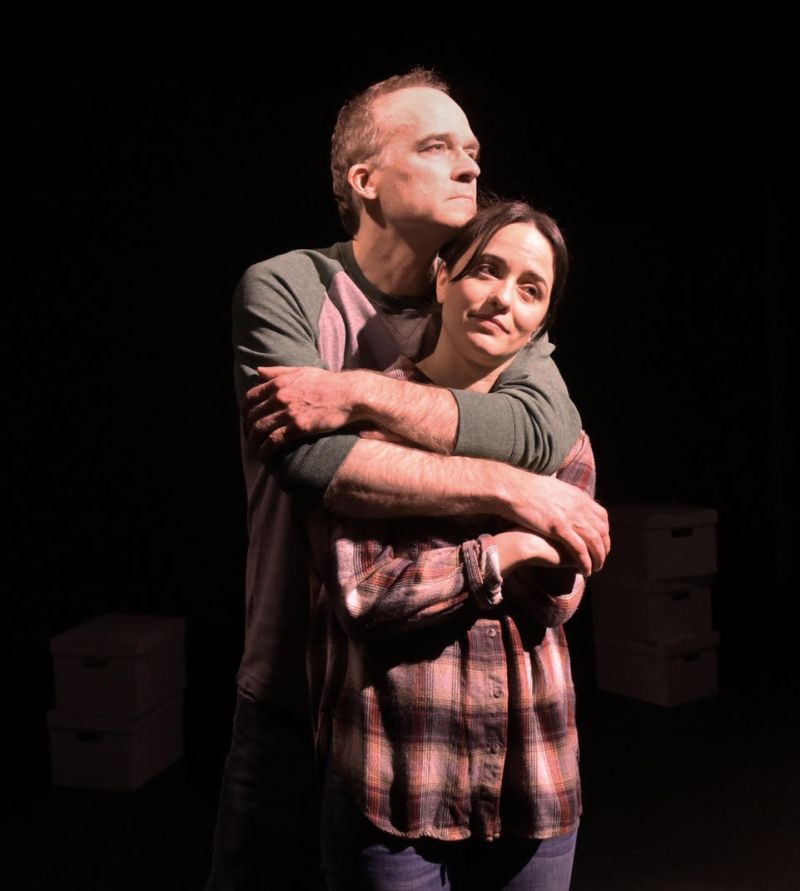Review: OPHELIA at the Odyssey Theatre
The play, which explores issues of memory, loss, and regret, runs April 12 through May 18th

For the first 20 minutes of Ophelia, a visiting production playing at the Odyssey Theatre through May 18, I wanted to look away.
It felt too private, like I was eavesdropping on a conversation that wasn’t meant to be overheard. It’s an intimacy created by both the smallness of the theater (the 99-seat performance space is organized by a handful of rows surrounding a simple stage) and the abrasive nature of the story. But, like anything, you get used to it.
The play opens with “MOM” (a talented Deborah Geffner) shuffling on stage with shaky hands and an old woman’s gait, facing the audience and introducing what she calls her “one-woman show.” She has forgotten her lines though. Something about Finland? Norway? No…it’s Denmark. (A foreshadowing nod to Hamlet’s Ophelia, which will become important later.)
It’s a fitting intro. After all, the show’s promo material hinted that this was a show about dementia, so the forgetful opening monologue makes sense. This is a woman destined to forget things. Right? But Mom’s memory issues seem to dissolve once she is joined on stage by her middle-aged “SON” (played by the award-winning Stefan Marks, who wrote and directed the show), who is there to help pack up her belongings in preparation for the move to Memory Care.
 And this is where you start to understand what you’re in for. MOM and SON hit the ground running, with her launching a tirade of insults, condemning everything from SON’s baldness and lack of sex life (which means, lack of grandkids) to her longstanding anger about getting pregnant with him in the first place and consequential disdain for SON’s very existence.
And this is where you start to understand what you’re in for. MOM and SON hit the ground running, with her launching a tirade of insults, condemning everything from SON’s baldness and lack of sex life (which means, lack of grandkids) to her longstanding anger about getting pregnant with him in the first place and consequential disdain for SON’s very existence.
It’s not easy to watch. Seeing a grown man squabble with an elderly woman about sex, gender, and suicidal tendencies is awkward enough; being a few feet from the pair as they do so makes it even more so. I felt markedly uncomfortable, and found myself looking around and wondering, “Is anyone else not OK with this?” Only my seat partner met my gaze.
Perhaps the most jarring thing is that this is not the portrayal of an aged mother that we’re used to seeing. MOM’s brutal frankness isn’t a charming “Golden Girls” brand of honesty; it’s cruelty. It becomes clear that this is not a character who is easy to like, especially when SON nonchalantly says, “I wish you hadn’t killed Dad.” To which she replies, “I had to put him out of my misery.”
Wait, what?
We then meet “HER” (a chameleon-esque Tatum Langton, who handles all of the various swings of emotions with impressive ease). She also has a mother with dementia, and wanders into a tea shop next to the memory care facility, where she meets SON. Before speaking to him, she faces the audience and launches into a digressive diatribe about the nature of humanity, her existence, and how it “all comes down to one sperm.”
Ohhhkaay, so… not sure what to do with that, but the rant does represent her character perfectly: She is both neurotic and honest, a cynical romantic. It’s charming, if not a bit alarming. Of course, HER and SON hit it off — in a weird, not-kissing, but loving each others’ neuroses, kind of way. 
She tells him she wants a baby. (What? It’s been, like five minutes.) He acts nervous but agrees that he wants one, too. The pair never get to the baby part though, because MOM whips out an orb-like “reset button” (it is one of the few physical props in the show) to rewind the relationship until SON forgets everything about HER in the first place.
SON then finds a new woman. This one (also played by Langton) is a blood splatter expert who likes to have sex while watching “Forensic Files.” They DO get pregnant. Well, maybe.
Um. Yeah. That’s all I can tell you.
The story bounces back and forth between SON’s lightning-fast relationships with the HERs and his increasingly toxic relationship with MOM. The saddest and perhaps most grounding scene in the play comes when MOM shuffles on stage with a Post-It on her hand that says, “Be nice to him.” She says she found it on her mirror but doesn’t know what it means or who wrote it. “It’s your handwriting, Mom,” SON tells her.
Like memories, the story doesn’t have a beginning, middle and end. Rather, it is made up of pieces — fragments of time — that fit together. Or don’t. Scenes happen in the past but flirt with the future in a way that when Langton’s character tells SON, “You remind me of someone I know from the future,” we get it.
There’s a lot to unpack here. Geffner and Langton play their parts with a fierceness that makes their stories — however strange — completely believable. Marks is more subdued in his role, but that’s perhaps because he is more a witness than an active participant. He has his show-stopping moment when SON performs a beat poem written by his dead father. It’s a passionate rant about strip clubs, violence, and running away from fatherhood. SON ends the performance with “Happy birthday, Dad.”
No one ever said this is a feel-good show.
That said, Ophelia may not be a play you’ll love. But you will want to talk about it the whole car ride home. Whether you can decode the existential jigsaw puzzle depends on how long you want to try. (On a personal note: it all reminds me of my English major past, when the class would debate about symbolism and foreshadowing for hours as if there was one right answer. There never is one right answer though, is there?)
 In the end, we can’t forget that this is a show about dementia. And, like the disease itself, many of the scenes don’t make a whole lot of sense. Time skips. Scenes rewind. Things reset. It all makes you wonder: Whose memories are these, anyway? It’s frustrating, but so is memory loss.
In the end, we can’t forget that this is a show about dementia. And, like the disease itself, many of the scenes don’t make a whole lot of sense. Time skips. Scenes rewind. Things reset. It all makes you wonder: Whose memories are these, anyway? It’s frustrating, but so is memory loss.
As for the play’s title, Shakespeare enthusiasts may remember that the character of Ophelia goes mad and drowns after Hamlet kills her father. Is madness the same as losing one’s memory? Maybe.
There’s a line in the play when MOM says, “I don’t like movies that are confusing. I like to understand things.”
So do I. But anything that makes you think is worth watching, right? So Ophelia — in all its memory lapses and uncomfortable places — is worth it. Just bring a friend so you have someone to help you put the pieces together when it’s all over.
Photos by Baranduin Briggs
Reader Reviews

Videos

